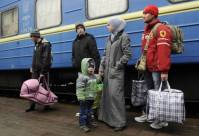Law on Internally Displaced people comes in for criticism

On June 19 parliament finally adopted a much-needed law on the legal status of people forced to leave their homes in the Crimea or in areas of conflict in Donbas. According to lawyer and civic activist Alexandra Dvoretska, the government is showing no intention of spending a penny on helping people displaced from the Crimea and East of Ukraine.
She believes that the law was adopted with the same fatal infringements as the notorious anti-protest laws of Jan 16. The law passed, she says, was not that which had been discussed, and that the text of the draft bill was only tabled on the day that it was voted on. One of the authors of the bill and head of the parliamentary committee on human rights, Valery Patskan [Udar party], she asserts, discussed an entirely different bill with members of NGOs and international institutions just the day before, on June 18.
With respect to the infringements in procedure, Dvoretska notes that the draft bill had not been worked on by any of the committees, and should not have been tabled without an assessment from the main committee. If this was a bill requiring urgent adoption, as per Article 101 of the Verkhovna Rada regulations, then it needed a decision from the President and Verkhovna Rada to fast-track consideration.
The author points to a telling discrepancy. The authors of the bill, Patskan and Serhiy Sobolyev [BYUT] assert that adoption of the bill will not require additional spending from the state budget.
Article 5.6 however states that money for the measures envisaged by the law will be taken from the state or local budgets according to procedure stipulated by the Cabinet of Ministers. So will the latter simply not stipulate any procedure for providing the assistance which the law guarantees?
The author also disputes the claim made in the explanatory note that the bill contains no rules or procedure that could lead to corruption. She points out that the procedure for receiving status of forced migrant and the possibility of being deprived of this status are entrusted to the same body – the State Migration Service, with this same body also determining who receives social assistance and help with accommodation, including by suggesting places. If the person rejects the proposed place, the bill (Article 3.3) states that s/he is deemed to not need state assistance with accommodation.
Dvoretska believes that this creates fertile ground for corruption, with officials being able to reap benefit out of the fact that places in cities where there are better chances of finding work, better schools for their children, medical care, etc., will be most sought-after.
Article 6 refers to ensuring the right of forced migrants to receive or reinstate identifying documents, as well as those confirming the right to pensions, social insurance, etc. in accordance with the law on ensuring the rights of citizens and legal regime on temporarily occupied territory. This, Dvoretska notes, does not cover people from eastern oblasts.
“This law does not resolve even 10% of the problems encountered by people who’ve ended up on occupied territory or in zones where anti-terrorist operations are underway”.
The law does not envisage humanitarian aid for people in those areas; it does not ensure their evacuation; does not mention the creation of humanitarian corridors; the provision of urgent medical and psychological assistance. It also fails to resolve urgent issues linked with unblocking bank accounts.
Even the terms do not correspond to those in international documents where it is customary to speak of internally displaced persons.
The author accuses the government of once again deceiving its citizens and adopting laws in breach of the Regulations, without public participation, lying and not trying to find out the needs of one fifth of the population.





